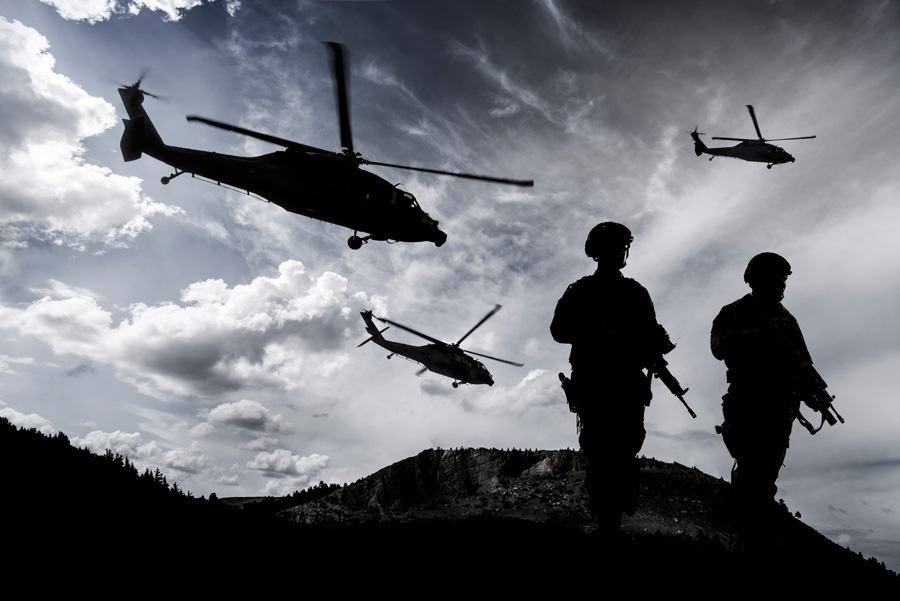The views expressed in our content reflect individual perspectives and do not represent the authoritative views of the Baha'i Faith.
Every gun that is made, every warship launched, every rocket fired signifies, in the final sense, a theft from those who hunger and are not fed, those who are cold and are not clothed. This world in arms is not spending money alone. It is spending the sweat of its laborers, the genius of its scientists, the hopes of its children. The cost of one modern heavy bomber is this: a modern brick school in more than 30 cities. It is two electric power plants, each serving a town of 60,000 population. It is two fine, fully equipped hospitals. It is some fifty miles of concrete pavement. We pay for a single fighter plane with a half million bushels of wheat. We pay for a single destroyer with new homes that could have housed more than 8,000 people… This is not a way of life at all, in any true sense. Under the cloud of threatening war, it is humanity hanging from a cross of iron…. Is there no other way the world may live? – Dwight D. Eisenhower
In my office I have a chart on the wall to remind me about our seemingly never-ending wars—the ones we’re fighting now, and the ones we constantly plan and prepare to fight in the future. The chart lists the total military spending of my country, the United States, in comparison to every other federal government expenditure. Here’s the breakdown:
6% on education
6% on the government itself
5.5% on housing and community expenses
5% on health and health care
4% on international affairs, including foreign aid
3% on energy and the environment
2.5% on science
2.5% on labor
2% on transportation
1% on food and agriculture
And 62.5% on the Department of Defense, war, nuclear weapons programs and veteran’s benefits.
The United States government spends more than three-fifths of its money on its military.
Does that shock you? It probably does most people, because unless they’re in the military or actively involved somehow in the military-industrial complex, they have little understanding of the enormous cost of such a continuing enterprise.
When I entered the United States Army I began my own education in military spending. Just a few days as a young draftee in boot camp on a city-sized Army base made me begin thinking about how much it costs to maintain a large, standing fighting force. As I looked at the thousands of soldiers I trained with; as I ate in the huge mess halls; as I realized what tanks and helicopters and fighter jets actually cost to build, equip and maintain, I started to understand the enormous magnitude of our military spending. I realized, after a while, what that money could possibly do if we found a way toward a peaceful future rather than a warlike one.
Imagine feeding and housing and providing clothing and transportation and health care for a million men and women, just to start. Then imagine the cost of constantly paying and training and re-training those men and women. Then, on top of that, try to consider the tremendous costs of weapons systems, especially the advanced, high-tech, so-called “smart” weapons needed in war today.
One computer-guided missile costs a million dollars. One B-2 bomber costs $2 billion.
Military spending doesn’t follow the standard laws of economics. The rapid pace of technological and scientific change means that so-called “defense” costs typically rise much faster and farther than civilian costs. The global race to build bigger, deadlier and more fearful weapons systems drives higher and higher military budgets. Then, in the end, those weapons systems become obsolete when new technologies come to the fore. This never-ending arms race and the constant readiness for war represents one of the greatest failures of our modern civilization, an ongoing, self-fulfilling cycle that constitutes a heinous collective crime against humanity. It robs us of prosperity, steals food from the mouths of children and expends enormous sums of money on death rather than life.
When a factory makes a truck, for example, that truck goes on to do actual work, and continues throughout its useful lifespan to contribute to the economy and the people who benefit from it. But when a factory makes a weapon, it makes no lasting contribution at all. That weapon sits idle, doing no useful work, giving nothing back to the society that made it, until it produces death.

The Baha’i teachings say that each one of these weapons and weapons systems represents a spiritual failure of epic proportions, calling them “the malignant fruits of material civilization:”
…among the teachings of Baha’u’llah is that although material civilization is one of the means for the progress of the world of mankind, yet until it becomes combined with Divine civilization, the desired result, which is the felicity of mankind, will not be attained. Consider! These battleships that reduce a city to ruins within the space of an hour are the result of material civilization; likewise the Krupp guns, the Mauser rifles, dynamite, submarines, torpedo boats, armed aircraft and bombers — all these weapons of war are the malignant fruits of material civilization. Had material civilization been combined with Divine civilization, these fiery weapons would never have been invented. Nay, rather, human energy would have been wholly devoted to useful inventions and would have been concentrated on praiseworthy discoveries. – Abdu’l-Baha, Selections from the Writings of Abdu’l-Baha, p. 303.
In this series of essays on the world’s military expenditures, we’ll explore the alternatives, and see if we can understand what it might take to transform our heavily-militarized material civilization into the peaceful and productive Divine civilization the Baha’i teachings prescribe.
Next: Greed, Commerce and Self-Interest: The Real Causes of War
You May Also Like
Comments

















At least one Christian Pastor is starting to ...question. I find that as a Sign. Though I travel with signs and Energy levels. Perhaps, this is just a match in the room. Hard task ahead for this Brother. I just say, know how God works. Amazing, The Light, The Way, The Earth, The Sky...99 names in the Qu'ran alone. Too big that word God..and all the names for anyone vellum book.
However, the question begs to question, who are we the US. Called the Melting Pot, called many things. However, now ...the U.S. is so much into hate and we speak of not liking guns in the U.S., yet N. America is the biggest gun supplier and if it does not come in weapons, it comes with the the weaponry of creating more homeless people and disenfranchising the people who made N. America great. Called an Enigma, Called, whatever that is not about the Light.
So while the the President, speaks of the Holocaust of guns in America, America is much of the reason why, many of the countries are decimated and destroyed. I can get into Yeman, Allepo, Africa...it goes on and on. I did Obama's first run where I lived, front to back. I believed in CHANGE. I believed in the Government and that it could do something and then God hit me. Well, God was always in my life. A preacher's kid raised with a guy who was my dad. Not a Huckabee moment. Taught me that God was all about Love and Grace and nothing else. What is going on is beyond the pale it is just evil.
I was shocked by the budget percentages listed in this article. After doing some research, the numbers are somewhat misleading. There is discretionary spending (which Congress allocates each year and military costs make up the majority) and mandatory spending (which is allocated by laws and is dominated by Social Security and Medicare).
The percentage in this article seem to only be for discretionary spending. When 2015 discretionary and mandatory spending are looked at together (i.e. total federal spending), the percentages ...are: 33% Social Security, 27% Medicare & Health, 16% Military.
You can argue that 16% is still too much to spend on the military budget when other discretionary areas (like education, housing, and the environment) receive a small fraction of that funding. But we shouldn't overlook that the total budget is dominated by Social Security and Health.
I found these numbers from the National Priorities Project which seems to be a reputable non-partisan group that disseminates budget information:
https://www.nationalpriorities.org/budget-basics/federal-budget-101/spending/